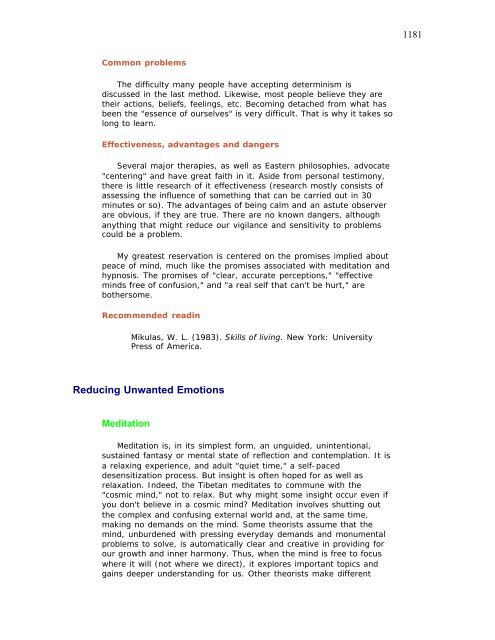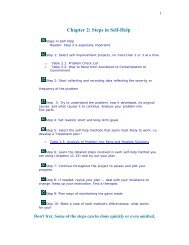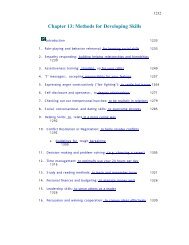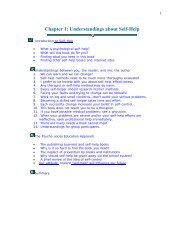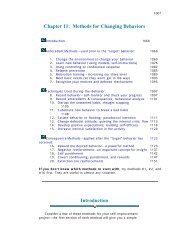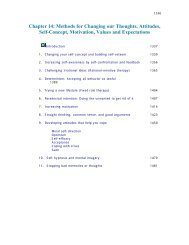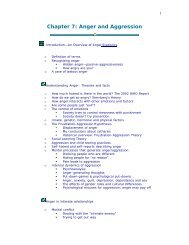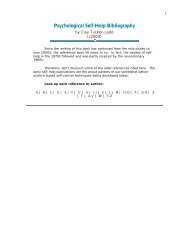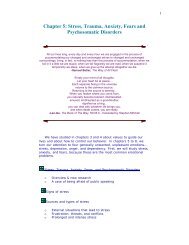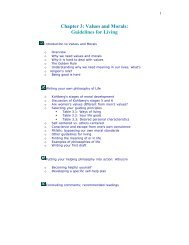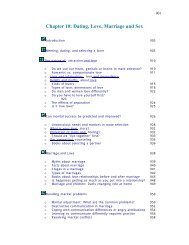Chapter 12: Methods for Changing Emotions - Psychological Self-Help
Chapter 12: Methods for Changing Emotions - Psychological Self-Help
Chapter 12: Methods for Changing Emotions - Psychological Self-Help
You also want an ePaper? Increase the reach of your titles
YUMPU automatically turns print PDFs into web optimized ePapers that Google loves.
1181<br />
Common problems<br />
The difficulty many people have accepting determinism is<br />
discussed in the last method. Likewise, most people believe they are<br />
their actions, beliefs, feelings, etc. Becoming detached from what has<br />
been the "essence of ourselves" is very difficult. That is why it takes so<br />
long to learn.<br />
Effectiveness, advantages and dangers<br />
Several major therapies, as well as Eastern philosophies, advocate<br />
"centering" and have great faith in it. Aside from personal testimony,<br />
there is little research of it effectiveness (research mostly consists of<br />
assessing the influence of something that can be carried out in 30<br />
minutes or so). The advantages of being calm and an astute observer<br />
are obvious, if they are true. There are no known dangers, although<br />
anything that might reduce our vigilance and sensitivity to problems<br />
could be a problem.<br />
My greatest reservation is centered on the promises implied about<br />
peace of mind, much like the promises associated with meditation and<br />
hypnosis. The promises of "clear, accurate perceptions," "effective<br />
minds free of confusion," and "a real self that can't be hurt," are<br />
bothersome.<br />
Recommended readin<br />
Mikulas, W. L. (1983). Skills of living. New York: University<br />
Press of America.<br />
Reducing Unwanted <strong>Emotions</strong><br />
Meditation<br />
Meditation is, in its simplest <strong>for</strong>m, an unguided, unintentional,<br />
sustained fantasy or mental state of reflection and contemplation. It is<br />
a relaxing experience, and adult "quiet time," a self-paced<br />
desensitization process. But insight is often hoped <strong>for</strong> as well as<br />
relaxation. Indeed, the Tibetan meditates to commune with the<br />
"cosmic mind," not to relax. But why might some insight occur even if<br />
you don't believe in a cosmic mind? Meditation involves shutting out<br />
the complex and confusing external world and, at the same time,<br />
making no demands on the mind. Some theorists assume that the<br />
mind, unburdened with pressing everyday demands and monumental<br />
problems to solve, is automatically clear and creative in providing <strong>for</strong><br />
our growth and inner harmony. Thus, when the mind is free to focus<br />
where it will (not where we direct), it explores important topics and<br />
gains deeper understanding <strong>for</strong> us. Other theorists make different


